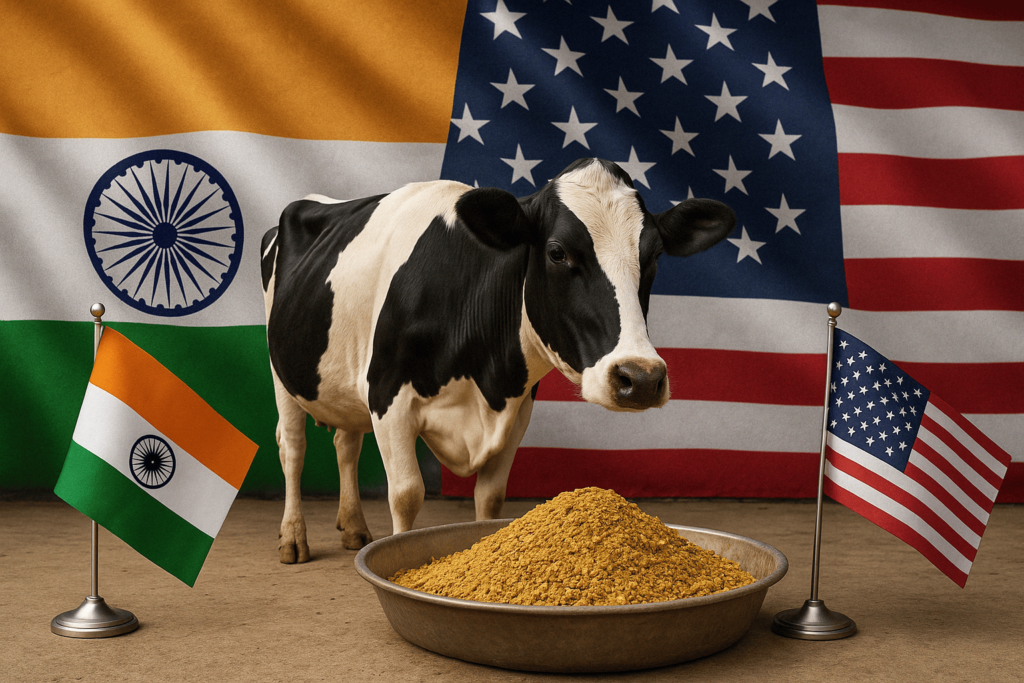India’s stance on banning US dairy imports due to animal feed practices creates tension ahead of the 2025 trade pact deadline. Despite US demands for market access, India remains firm on its vegetarian feed policy.
In a significant development ahead of the 2025 India-US trade pact deadline, India has reiterated its firm stance against the import of US dairy products, primarily due to concerns regarding animal feed practices in the US. As virtual trade talks between the two nations intensify, one of the key sticking points has emerged around the issue of animal-derived feed ingredients used in US dairy farming. Indian negotiators have made it clear that the US must either modify its animal feed practices or adopt India’s vegetarian certification process if it hopes to gain access to India’s vast dairy market.
India’s dairy sector, which is heavily regulated by cooperatives and smallholder farmers, follows strict guidelines concerning the type of feed used for cattle. Unlike the US, where animal-based protein sources such as bone meal and blood meal are commonly included in cattle feed, Indian regulations prioritize plant-based feed, with protein primarily sourced from oil cakes and other vegetarian materials. The Indian government has emphasized that any dairy imports from the US that violate these principles would be unacceptable, particularly because these practices conflict with the country’s food safety rules and cultural values.
The issue of animal feed in the dairy sector has long been a point of contention between India and the US. In 2025, India’s negotiators made it clear that allowing US dairy products, such as cheese and butter, into the market would only be possible if the US aligns its cattle feed practices with India’s vegetarian standards or adopts India’s vegetarian certification process. This certification, symbolized by the green dot on packaging, signifies that the dairy products are sourced from animals that are exclusively fed plant-based diets.
The US, which is seeking new markets after facing tariff walls from China, has pushed for broader access to the Indian dairy market. However, Indian authorities remain resolute, not only due to health concerns but also due to the deeply ingrained cultural sensitivities regarding animal feed in the country.
Trade Negotiations and the Impact on Bilateral Relations
In recent rounds of trade talks, India has expressed its willingness to discuss tariff concessions on agricultural products like nuts and fruits, but the dairy issue remains a non-negotiable point. India’s stance is shaped not only by regulatory considerations but by its long-standing tradition of vegetarianism and its commitment to protecting domestic farmers’ interests. The Indian side has made it clear that this issue goes beyond trade; it is about preserving the country’s cultural and social fabric.
Ajay Srivastava, co-founder of the Global Trade Research Initiative (GTRI), emphasized that India’s position highlights the complexities of global trade agreements, where cultural practices must be considered alongside economic concerns.
India’s dietary practices are integral to its identity, and any trade deal must respect that.”
Ajay Srivastava, co-founder GTRI
On the other hand, the United States is pushing for broader market access to its agricultural exports, including dairy products, in exchange for tariff reductions on certain products like almonds and pistachios. However, the US remains firm on the dairy issue, seeking to address restrictions that hinder the flow of US dairy exports into India.
As of now, India imposes significant tariffs on certain US agricultural products, including dairy, with duties as high as 100% on walnuts. Despite these barriers, trade between the two countries has seen notable growth, with bilateral trade reaching over $86 billion in FY25. While the US continues to seek access to India’s dairy market, it remains unclear whether the cultural and regulatory differences regarding animal feed will be overcome in time for the trade pact’s expected completion in fall 2025.
Industry Insight
The ongoing negotiations signal growing tensions between the need for global market access and the preservation of domestic agricultural practices. For dairy entrepreneurs in India, this situation underscores the importance of adhering to local norms while navigating international trade agreements. The outcome of this issue may set a significant precedent for future trade negotiations, particularly in sectors like agriculture where cultural sensitivities and regulatory practices often clash with market pressures.
India’s firm stand on animal feed regulations highlights the ongoing struggle to balance trade with cultural and ethical considerations. As the trade talks move forward, it remains to be seen whether the US will adapt its dairy production practices to align with India’s expectations or if the two countries will find another path to compromise before the 2025 deadline.
